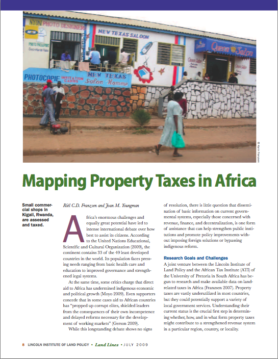Land Lines
Africa’s enormous challenges and equally great potential have led to intense international debate over how best to assist its citizens. according
to the united nations educational.
Scientific and Cultural organization (2009), the continent contains 33 of the 49 least developed countries in the world. Its population faces press- ing needs ranging from basic health care and education to improved governance and strength- ened legal systems.
At the same time, some critics charge that direct aid to africa has undermined indigenous economic and political growth (moyo 2009). even supporters concede that in some cases aid to african countries has “propped up corrupt elites, shielded leaders from the consequences of their own incompetence and delayed reforms necessary for the develop- ment of working markets” (gerson 2009).
While this longstanding debate shows no signs of resolution, there is little question that dissemination of basic information on current govern- mental systems, especially those concerned with revenue, finance, and decentralization, is one form of assistance that can help strengthen public institutions and promote policy improvements with- out imposing foreign solutions or bypassing indigenous reform.
